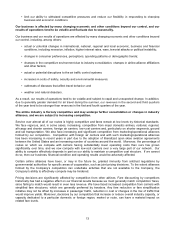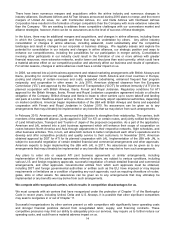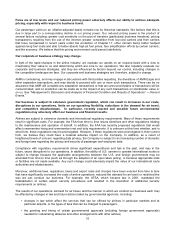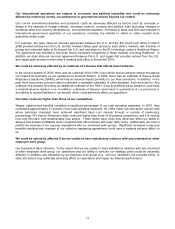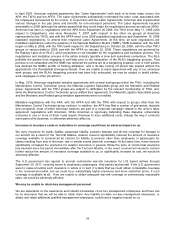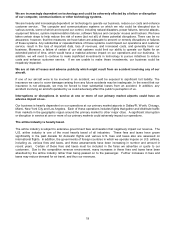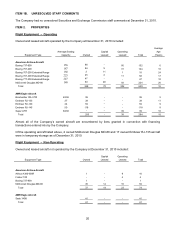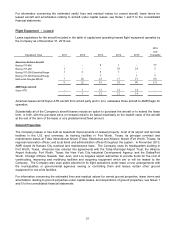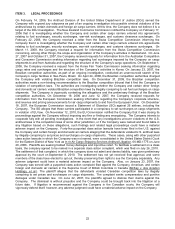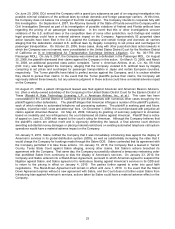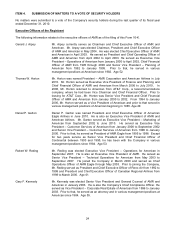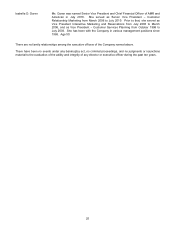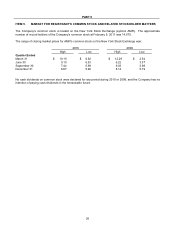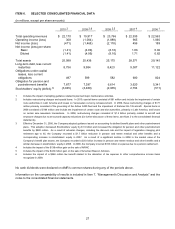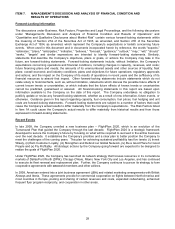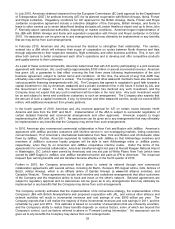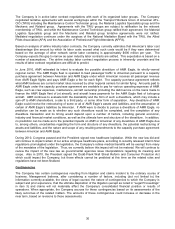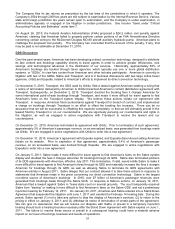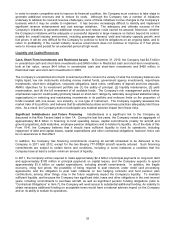American Airlines 2010 Annual Report Download - page 26
Download and view the complete annual report
Please find page 26 of the 2010 American Airlines annual report below. You can navigate through the pages in the report by either clicking on the pages listed below, or by using the keyword search tool below to find specific information within the annual report.
23
On June 20, 2006, DOJ served the Company with a grand jury subpoena as part of an ongoing investigation into
possible criminal violations of the antitrust laws by certain domestic and foreign passenger carriers. At this time,
the Company does not believe it is a target of the DOJ investigation. The Company intends to cooperate fully with
this investigation. On September 4, 2007, the Attorney General of the State of Florida served the Company with a
Civil Investigative Demand as part of its investigation of possible violations of federal and Florida antitrust laws
regarding the pricing of air passenger transportation. In the event that this or other investigations uncover
violations of the U.S. antitrust laws or the competition laws of some other jurisdiction, such findings and related
legal proceedings could have a material adverse impact on the Company. Approximately 52 purported class
action lawsuits have been filed in the U.S. against the Company and certain foreign and domestic air carriers
alleging that the defendants violated U.S. antitrust laws by illegally conspiring to set prices and surcharges for
passenger transportation. On October 25, 2006, these cases, along with other purported class action lawsuits in
which the Company was not named, were consolidated in the United States District Court for the Northern District
of California as In re International Air Transportation Surcharge Antitrust Litigation, Civ. No. 06-1793 (the
Passenger MDL). On July 9, 2007, the Company was named as a defendant in the Passenger MDL. On August
25, 2008, the plaintiffs dismissed their claims against the Company in this action. On March 13, 2008, and March
14, 2008, an additional purported class action complaint, Turner v. American Airlines, et al., Civ. No. 08-1444
(N.D. Cal.), was filed against the Company, alleging that the Company violated U.S. antitrust laws by illegally
conspiring to set prices and surcharges for passenger transportation in Japan and certain European countries,
respectively. The Turner plaintiffs have failed to perfect service against the Company, and it is unclear whether
they intend to pursue their claims. In the event that the Turner plaintiffs pursue their claims, the Company will
vigorously defend these lawsuits, but any adverse judgment in these actions could have a material adverse impact
on the Company.
On August 21, 2006, a patent infringement lawsuit was filed against American and American Beacon Advisors,
Inc. (then a wholly-owned subsidiary of the Company) in the United States District Court for the Eastern District of
Texas (Ronald A. Katz Technology Licensing, L.P. v. American Airlines, Inc., et al.). This case has been
consolidated in the Central District of California for pre-trial purposes with numerous other cases brought by the
plaintiff against other defendants. The plaintiff alleges that American infringes a number of the plaintiff’s patents,
each of which relates to automated telephone call processing systems. The plaintiff is seeking past and future
royalties, injunctive relief, costs and attorneys' fees. On December 1, 2008, the court dismissed with prejudice all
claims against American Beacon. On May 22, 2009, following its granting of summary judgment to American
based on invalidity and non-infringement, the court dismissed all claims against American. Plaintiff filed a notice
of appeal on June 22, 2009 with respect to the court’s ruling for American. Although the Company believes that
the plaintiff’s claims are without merit and is vigorously defending the lawsuit, a final adverse court decision
awarding substantial money damages or placing material restrictions on existing automated telephone call system
operations would have a material adverse impact on the Company.
On January 5, 2010, Sabre notified the Company that it was immediately introducing bias against the display of
American’s services in its global distribution system (GDS), as well as substantially increasing the rates that it
would charge the Company for bookings made through the Sabre GDS. Sabre contended that its agreement with
the Company permitted it to take these actions. On January 10, 2010, the Company filed a lawsuit in Tarrant
County, Texas State Court against Sabre alleging, among other claims, that Sabre’s actions breached its
agreement with the Company. That same day, the Company successfully obtained a temporary restraining order
that prohibited Sabre from continuing to bias the display of American’s services. On January 23, 2010, the
Company and Sabre entered into a Stand-Down Agreement, pursuant to which American agreed to suspend the
litigation against Sabre, and Sabre agreed not to reintroduce biasing against American’s services in its GDS and
to return to the pricing in effect on January 4, 2010. The parties further agreed to enter into good faith
negotiations. The Stand-Down Agreement will remain in effect until June 1, 2010. In the event that the Stand
Down Agreement expires without a new agreement with Sabre, and the Court does not further enjoin Sabre from
introducing bias against American’s services, actions taken by Sabre could have a material adverse effect on the
Company.


